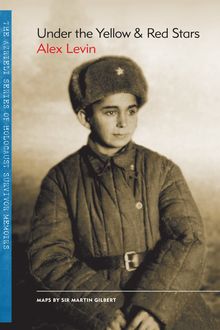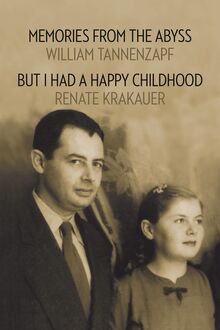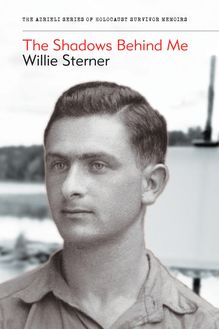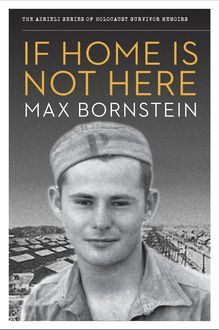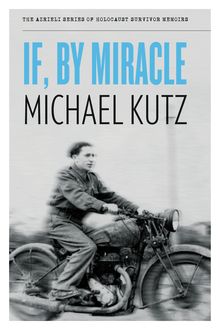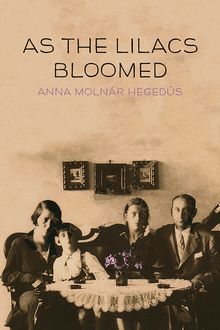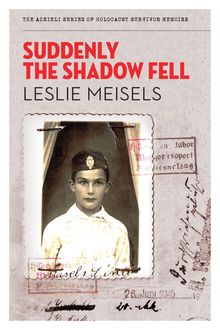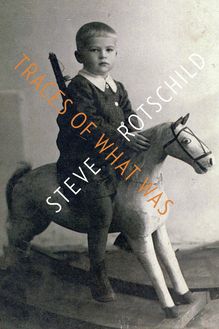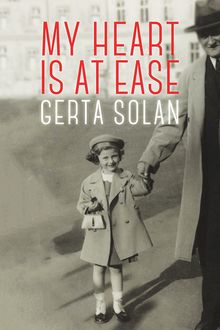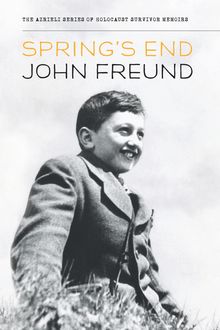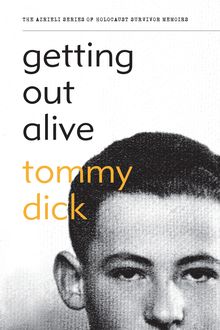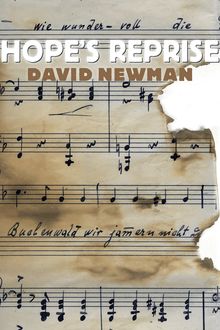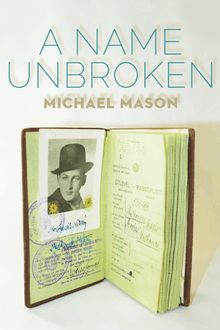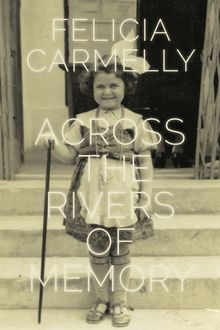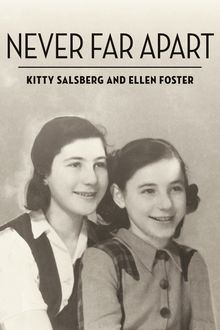-
 Univers
Univers
-
 Ebooks
Ebooks
-
 Livres audio
Livres audio
-
 Presse
Presse
-
 Podcasts
Podcasts
-
 BD
BD
-
 Documents
Documents
-
- Cours
- Révisions
- Ressources pédagogiques
- Sciences de l’éducation
- Manuels scolaires
- Langues
- Travaux de classe
- Annales de BEP
- Etudes supérieures
- Maternelle et primaire
- Fiches de lecture
- Orientation scolaire
- Méthodologie
- Corrigés de devoir
- Annales d’examens et concours
- Annales du bac
- Annales du brevet
- Rapports de stage
La lecture à portée de main
Vous pourrez modifier la taille du texte de cet ouvrage
Découvre YouScribe en t'inscrivant gratuitement
Je m'inscrisDécouvre YouScribe en t'inscrivant gratuitement
Je m'inscrisEn savoir plus
Vous pourrez modifier la taille du texte de cet ouvrage
En savoir plus

Description
Sujets
Informations
| Publié par | Azrieli Foundation |
| Date de parution | 01 septembre 2012 |
| Nombre de lectures | 3 |
| EAN13 | 9781897470732 |
| Langue | English |
| Poids de l'ouvrage | 1 Mo |
Informations légales : prix de location à la page 0,0300€. Cette information est donnée uniquement à titre indicatif conformément à la législation en vigueur.
Extrait
Little Girl Lost
Betty Rich
The Azrieli Series of Holocaust Survivor Memoirs
INTERNATIONAL ADVISORY COUNCIL
Doris Bergen, Chancellor Rose and Ray Wolfe Chair in Holocaust Studies, University of Toronto
Sara R. Horowitz, Director of the Israel and Golda Koschitzky Centre for Jewish Studies, York University
Nechama Tec, Professor Emerita of Sociology, University of Connecticut
Avner Shalev, Chairman of the Yad Vashem Directorate, Jerusalem
Naomi Azrieli, Publisher
Andrea Knight, Managing Editor
Arielle Berger, Editor
Mia Spiro, Editor
Elizabeth Lasserre, Senior Editor, French-Language Editions
Aurélien Bonin, Assistant Editor / Researcher, French-Language Editions
Elin Beaumont, Outreach and Communications Manager
Tim MacKay, Program Assistant
Susan Roitman, Executive Coordinator
Mary Arvanitakis, Executive Coordinator
Mark Goldstein, Art Director
Nicolas Côté, Layout, French-Language Editions
Maps by François Blanc
Contents
The Azrieli Series of Holocaust Survivor Memoirs
Series Preface:In their own words...
About the Glossary
Introduction
Dedication
Author’s Preface
Beginnings
A New Path
Taking Chances
Entering a New World
Arkhangelsk Labour Camp
South to Georgia
Kutaisi
Encountering the Truth
David
Finding a Smuggler
Starting Over
Epilogue
Glossary
Photographs
Copyright
About the Azrieli Foundation
Also Available
Series Preface:In their own words...
In telling these stories, the writers have liberated themselves. For so many years we did not speak about it, even when we became free people living in a free society. Now, when at last we are writing about what happened to us in this dark period of history, knowing that our stories will be read and live on, it is possible for us to feel truly free. These unique historical documents put a face on what was lost, and allow readers to grasp the enormity of what happened to six million Jews – one story at a time.
D avid J . A zrieli , C.M., C.Q., M.Arch
Holocaust survivor and founder, The Azrieli Foundation
Since the end of World War II , over 30,000 Jewish Holocaust survivors have immigrated to Canada. Who they are, where they came from, what they experienced and how they built new lives for themselves and their families are important parts of our Canadian heritage. The Azrieli Foundation’s Holocaust Survivor Memoirs Program was established to preserve and share the memoirs written by those who survived the twentieth-century Nazi genocide of the Jews of Europe and later made their way to Canada. The program is guided by the conviction that each survivor of the Holocaust has a remarkable story to tell, and that such stories play an important role in education about tolerance and diversity.
Millions of individual stories are lost to us forever. By preserving the stories written by survivors and making them widely available to a broad audience, the Azrieli Foundation’s Holocaust Survivor Memoirs Program seeks to sustain the memory of all those who perished at the hands of hatred, abetted by indifference and apathy. The personal accounts of those who survived against all odds are as different as the people who wrote them, but all demonstrate the courage, strength, wit and luck that it took to prevail and survive in such terrible adversity. The memoirs are also moving tributes to people – strangers and friends – who risked their lives to help others, and who, through acts of kindness and decency in the darkest of moments, frequently helped the persecuted maintain faith in humanity and courage to endure. These accounts offer inspiration to all, as does the survivors’ desire to share their experiences so that new generations can learn from them.
The Holocaust Survivor Memoirs Program collects, archives and publishes these distinctive records and the print editions are available free of charge to libraries, educational institutions and Holocaust- education programs across Canada, and at Azrieli Foundation educational events. They are also available for sale to the general public at bookstores. All editions of the books are available for free download on our web site at: www.azrielifoundation.org .
The Azrieli Foundation would like to express appreciation to the following people for their invaluable efforts in producing this series: Simone Abrahamson, Florence Buathier, Darrel Dickson (Maracle Press), Sir Martin Gilbert, Stan Greenspan, Arnaud Regnaud, Sylwia Szymańska-Smolkin, Keaton Taylor, Robert Jan van Pelt, Lise Viens, Margie Wolfe and Emma Rodgers of Second Story Press, and Piotr Wróbel.
About the Glossary
The following memoir contains a number of terms, concepts and historical references that may be unfamiliar to the reader. For information on major organizations; significant historical events and people; geographical locations; religious and cultural terms; and foreign-language words and expressions that will help give context and background to the events described in the text, please see the Glossary .
Introduction
If I close my eyes, I see a movie. I see myself as a little girl; I see the sadness in my eyes. I still look after that little girl today. She never grew up. She’s still there, waiting and hoping and always so alone. She’s a part of me that is so lost and confused. So I enter the movie theatre of my life and try to put together scattered fragments, like a documentary, and take the little girl out into the open. I follow her across continents, through the trials and tribulations of World War II and through miraculous events of survival, when the cruel and harsh reality of everyday life was so overwhelming that it didn’t take much to break down. She survived in a strange land and a strange culture, all alone.
In this poetic passage Betty Rich ponders the challenges of finding the form and language in which to tell her Holocaust story and to reflect on its meanings in her life after liberation. More than forty years after her many experiences escaping from the Nazis, she composes an elegiac reflection that moves between “I” and “She,” and so positions herself throughout her memoir as character, narrator and commentator. Looking back onto the past and into herself, she recreates her odyssey through World War II as both testimony and a meditation on what it meant to her sense of self to endure and survive. Born Basia Kohn in June 1923, Rich writes her story of growing up in pre-war Poland and escape into the Soviet Union as a montage of graphic snapshots and moments in motion. Interwoven into her memories of events and people is her powerful longing to understand the dual sense of self created by her experiences both as a child within her family and community and as a young woman growing into adulthood in exile. Recounting the story of her first twenty-six years offers the welcome opportunity to provide a coherent structure to the chaotic events that engulfed her and those with whom she escaped from the Nazi invasion of Poland into Soviet labour camps.
In addition to historical documentation and a reflective form of narrative, Rich’s memoir offers testimony that reveals the psychological pressures on survival and its aftermath. We find the beginnings of this aftermath in Rich’s decision to close her memoir with reflections and portions of letters about the new and complicated beginnings of her life in Canada. Here, along with the challenges of adaptation to a new language and culture, she summarizes her encounters and initial impressions of the Toronto Jewish community and their social habits as a complicated “wonderland.” The brevity of this conclusion concentrates our attention on her experience of survival, with its ominous but riveting adventures across an unknown continent, emotional isolation, and intense intimate relationships. Her narrative of five years from the frozen north to the warm climes of Georgia in the Soviet Union also represents a belated coming of age story where despite or perhaps because of physical and emotional suffering, Basia Kohn experienced a voyage of self discovery and self-determination. It is this legacy along with the rich complexity of her portrait of her childhood and family that she offers to her children, grandchildren and her wider audience.
Basia had already revealed her talent and drive to write in the diaries she kept since childhood. As she looks back from the perspective of her moment of escape in 1939 when she was sixteen, she creates a multilayered perspective that shows us her process of remembering. She uses fragments of her memory to recreate a complex portrait of her childhood in the city of Zduńska Wola, a town of textile manufacturing in central Poland, of about 20,000 people, and located forty kilometres southwest of the city of Lodz. She then interlaces her developing awareness of relationships within her family as they intersect with the local Jewish community. At the same time she recognized the economic and political forces that shaped the dynamics of these relationships as they unfolded. Her memoir continues by following the chronology of her cross continental travels, from the fears of the Nazi presence in Poland to privation in labour camps and moments and places of reprieve. Rich’s memoir is punctuated by harrowing coincidences and personal and political treachery as well as fortuitous encounters that led to loving and supportive relationships.
Writing from her home in Toronto some forty years after the war’s end encourages Betty Rich to reflect on whether it is possible for her and her readers to understand the events th
-
 Univers
Univers
-
 Ebooks
Ebooks
-
 Livres audio
Livres audio
-
 Presse
Presse
-
 Podcasts
Podcasts
-
 BD
BD
-
 Documents
Documents
-
Jeunesse
-
Littérature
-
Ressources professionnelles
-
Santé et bien-être
-
Savoirs
-
Education
-
Loisirs et hobbies
-
Art, musique et cinéma
-
Actualité et débat de société
-
Jeunesse
-
Littérature
-
Ressources professionnelles
-
Santé et bien-être
-
Savoirs
-
Education
-
Loisirs et hobbies
-
Art, musique et cinéma
-
Actualité et débat de société
-
Actualités
-
Lifestyle
-
Presse jeunesse
-
Presse professionnelle
-
Pratique
-
Presse sportive
-
Presse internationale
-
Culture & Médias
-
Action et Aventures
-
Science-fiction et Fantasy
-
Société
-
Jeunesse
-
Littérature
-
Ressources professionnelles
-
Santé et bien-être
-
Savoirs
-
Education
-
Loisirs et hobbies
-
Art, musique et cinéma
-
Actualité et débat de société
- Cours
- Révisions
- Ressources pédagogiques
- Sciences de l’éducation
- Manuels scolaires
- Langues
- Travaux de classe
- Annales de BEP
- Etudes supérieures
- Maternelle et primaire
- Fiches de lecture
- Orientation scolaire
- Méthodologie
- Corrigés de devoir
- Annales d’examens et concours
- Annales du bac
- Annales du brevet
- Rapports de stage
